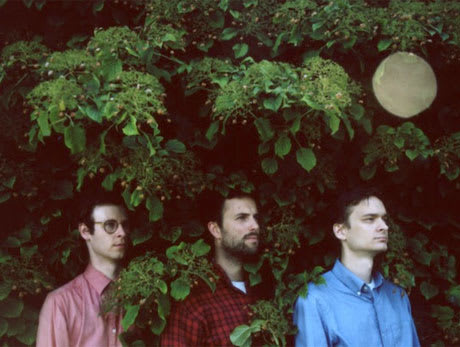Too often, "experimental" is used as a catch-all descriptor for music that simply sounds weird. And while Toronto trio Absolutely Free certainly inject an off-kilter vibe to their synth-heavy Krautrock-inspired tunes, the experimentation occurs more in the way that the music is made and presented. After the demise hard-working art-punks DD/MM/YYYY, multi-instrumentalists Matt King, Moshe Rozenberg, and Mike Claxton — along with Jordan Holmes, who has since parted ways with the trio — launched Absolutely Free with a stunning single ( "UFO"/"Glass Tassle") and a memorable multi-venue experience involving a live score to a silent sci-fi film.
Since then, they've played at an indoor pool, re-imagined scores for a few Norman McLaren animations as part of a TIFF event, and delivered an impressive full-length debut for Arts & Crafts — complete with a holographic listening party.
Throughout each of these endeavours, they've maintained an open-mindedness to the possibilities of both sounds and the manner in which they make them. "We did a crazy thing for SummerWorks called Balcony Scene," says Rozenberg during a recent pre-practise chat in their rehearsal space. "We would basically play a one-minute piece to one person at a time. It's a good exercise in re-writing a song — just cracking it wide open and changing the tempo or the feel. And that's something that we do a lot more now."
Credit for that sort of approach on the new album goes, at least in part, to Fucked Up guitarist Mike Haliechuk. "He made sure to keep things extremely vague as a producer, so that we'd struggle with those directions and then interpret them," says Rozenberg. "The best example is when he said: 'You guys need to get less cerebral about your beats.'" The result of all these experiments might actually be a little less weird than what they initially started with. While their early singles displayed a more streamlined approach to songwriting than the sonic freak-outs of DD/MM/YYYY, the band still managed to pack a ton of rhythmic shifts and bizarre samples into those initial tunes. But with Absolutely Free, there's a further sense of restraint, making highly crafted moments of drama far more compelling. "Just the way we recorded the album, not thinking about the live performance, really informed us as listeners — how it makes us feel, and how to make the music effective as opposed to how to play it effectively," says King.
Or as Rozenberg explains: "Say we're taking people to the moon. We don't want them barfing on their way there. We want to ease them into it…"
"Because the moon is crazy enough as it is," adds Claxton.
Since then, they've played at an indoor pool, re-imagined scores for a few Norman McLaren animations as part of a TIFF event, and delivered an impressive full-length debut for Arts & Crafts — complete with a holographic listening party.
Throughout each of these endeavours, they've maintained an open-mindedness to the possibilities of both sounds and the manner in which they make them. "We did a crazy thing for SummerWorks called Balcony Scene," says Rozenberg during a recent pre-practise chat in their rehearsal space. "We would basically play a one-minute piece to one person at a time. It's a good exercise in re-writing a song — just cracking it wide open and changing the tempo or the feel. And that's something that we do a lot more now."
Credit for that sort of approach on the new album goes, at least in part, to Fucked Up guitarist Mike Haliechuk. "He made sure to keep things extremely vague as a producer, so that we'd struggle with those directions and then interpret them," says Rozenberg. "The best example is when he said: 'You guys need to get less cerebral about your beats.'" The result of all these experiments might actually be a little less weird than what they initially started with. While their early singles displayed a more streamlined approach to songwriting than the sonic freak-outs of DD/MM/YYYY, the band still managed to pack a ton of rhythmic shifts and bizarre samples into those initial tunes. But with Absolutely Free, there's a further sense of restraint, making highly crafted moments of drama far more compelling. "Just the way we recorded the album, not thinking about the live performance, really informed us as listeners — how it makes us feel, and how to make the music effective as opposed to how to play it effectively," says King.
Or as Rozenberg explains: "Say we're taking people to the moon. We don't want them barfing on their way there. We want to ease them into it…"
"Because the moon is crazy enough as it is," adds Claxton.
